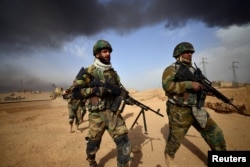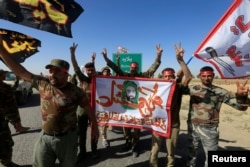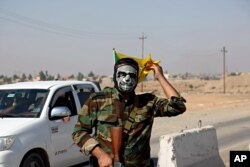As the Iraqi forces come closer to expelling the Islamic State (IS) terror group from their last remaining enclaves inside Iraq, Shi’ite paramilitary groups aligned with Iran are attempting to retain their power by integrating into the Iraq’s political system.
Those paramilitary groups started to gain prominence due to their battlefield successes against IS after the collapse of the Iraqi army in mid-2014. They operate under an umbrella organization of nearly 70 militia groups known as Popular Mobilization Forces (PMF) formed following the Shi’ite Grand Ayatollah Ali Sistani’s fatwa to fill the security vacuum and drive IS militants out of Iraq.
What was initially thought of as a temporary set up to resist IS expansion in Iraq, is now positioning itself to become a permanent institution in the Iraqi system of government. Leaders of the so-called PMF are now pushing the central government in Baghdad to recognize them as a part of the state’s defense system and provide its fighters with salaries and pensions.
“The government should fulfil its responsibility of granting the rightful share of salaries for the members of Popular Mobilization Forces in the 2018 budget,” Ahmad al-Assadi, spokesperson for the PMF and a Shi’ite member of the Iraqi Parliament said on Thursday.
“Those salaries need to be equal to their counterparts from the security forces,” Assadi added.
PMF demands come at a time when Iraq prepares for a new budget and general elections in 2018.
The Iraqi government has already legalized the PMF and since 2015 dedicated a budget of nearly $60 million for its operations. A parliament bill passed in November 2016 recognized the group as a government entity alongside the military and said it “will represent and defend all Iraqis, wherever they are.”
But al-Assadi said the parliament bill is missing details about fate of the group after Islamic State is pushed out of its last stronghold in the western Anbar province.
He also added that some Iraqi parliament members have sent a draft law to the Iraqi Council of Ministries that lays out the future responsibilities of the group.
“We want them to speed up the process of discussions on the draft and send it to the parliament for approval,” al-Assadi said during a press conference in Baghdad.
Political ambitions
Al-Assadi did not mention if the draft also included the prospect of PFM participation in the Iraqi electoral process, but multiple local media sources have reported that the group’s political wings intend to compete in the general elections next year.
The Iraqi Prime Minister Haider al-Abadi, however, on Wednesday said that no political party with armed wings will be allowed to take part in the elections.
“Political parties should give up their armed wings, or they will be prevented from taking part,” al-Abadi said during a press conference.
Despite al-Abadi’s call, according to pan-Arab media outlet al-Arab al-Jadeed, over 20 political affiliates of the PMF have been registered for the May 2018 elections.
The news outlet reported that controversial groups such as Badr Organization, Asa'ib Ahl al-Haq, and Kata’ib Hezbollah are among the political wings that have gained permission to participate in the elections. Those groups are known to receive direct support from Iraq and are designated terrorist organizations by the U.S. due to their involvement in attacks on Americans since 2003.
U.S. perspective
During a rare joint meeting with the leaders of Iraq and Saudi Arabia in Riyadh last month, United States Secretary of State Rex Tillerson said it was time for the Iranian-backed militias and their Iranian advisers to “go home.”
The U.S. is concerned that Iran will use those militias to expand its influence in Iraq after the defeat of the so-called Islamic State in the country.
Attempts to fully integrate the PMF into the Iraqi government system are likely to also face a strong local opposition, particularly from the Kurds and Sunnis who accuse the group of committing human rights violations against non-Shi’ite groups and pushing a sectarian agenda.
“Those militia groups do not serve the interests of Iraq,” Faris al-Faris, a Sunni parliament member representing Anbar province told VOA, adding that the central government should disarm those within PMF who are closely tied to Iran.
“The future safety and prosperity of Iraq depends on the extent to which its sovereignty is preserved,” Faris added.
Militias present challenge
Experts say bringing those militias under full control of the Iraqi government will be challenging for a state deeply divided along sectarian lines and strongly influenced by regional powers.
“The United States can play a major role in helping the government of al-Abadi reorganize armed groups after the defeat of Daesh,” said Iraqi expert Mahmoud Fuad using another acronym for IS. “But this effort will be faced up by Iran which has reaped most of U.S. efforts in Iraq since 2003.”
Fuad added that the influence of the Shi’ite militias would likely determine the future of conflict in Iraq as it prepares to recover from the Islamic State take over.
“The defeat of Daesh is a good news for Iraq but the way ahead is challenged by sectarian groups that are not quite disciplined and controlled by the state. Those groups could easily turn the country back to instability if not managed appropriately,” Fuad said.







